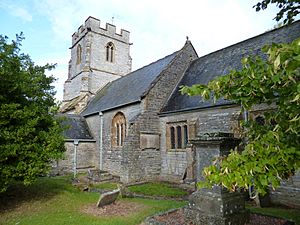Church of St Andrew, Aller facts for kids
Quick facts for kids Church of St Andrew |
|
|---|---|
 |
|
| Location | Aller, Somerset, England |
| Built | 11th century |
|
Listed Building – Grade II*
|
|
| Official name: Church of St Andrew | |
| Designated | 17 April 1959 |
| Reference no. | 1227327 |
| Lua error in Module:Location_map at line 420: attempt to index field 'wikibase' (a nil value). | |
The Church of St Andrew is a special old church in Aller, a village in Somerset, England. It belongs to the Church of England. This amazing building was first built way back in the 11th century, which means it's over 900 years old! Because it's so old and important, it's protected as a Grade II* listed building. This means it's a very important historic place that needs to be preserved.
Contents
History of the Church
Ancient Origins and Changes Over Time
The Church of St Andrew has very old roots, going back to the Anglo-Saxons. Some parts of the church, like a door and a window, are from the 12th and 13th centuries. Imagine, these parts are still standing after hundreds of years!
Over time, the church has been repaired and updated many times. A big restoration happened in 1861–62. An architect named John Norton led this work. During this time, a new room called a vestry was added. A vestry is a room in a church where clergy robes are kept, and where priests and choir members prepare for services.
Protecting a Historic Treasure
Today, Historic England has put the Church of St Andrew on its Heritage at Risk Register. This means the church is a very important historic site that needs special care and attention to keep it safe for the future. Work has already been done to fix the church's tower. However, more repairs are still needed for the roofs to protect the building from the weather.
The church is part of a group of parishes in the Diocese of Bath and Wells. This group includes Aller, High Ham with Low Ham, and Huish Episcopi cum Langport.
Church Design and Features
Building Materials and Structure
The Church of St Andrew is built from a type of stone called hamstone. Its roofs are made of slate. The church has a main area called a nave with three sections, and a smaller area near the altar called a chancel with two sections. The church's tower has three levels and is supported by strong corner buttresses. These buttresses help the walls stand firm.
Inside the Church: Old and New
Most of the things inside the church, like benches and decorations, are from the 1800s. However, there's a special wooden pulpit that is much older, from 1610. A pulpit is a raised stand where a preacher gives sermons.
The church also has two fonts. A font is a basin used for baptisms. One font is shaped like a tulip, and the other is octagonal (eight-sided).
The Ancient Saxon Font
One of the fonts is very special. It's a simple bowl made of limestone, less than a meter tall. Experts believe it might be from the Saxon period, making it incredibly old. It's one of only three such fonts in England!
This ancient font might even be the one used to baptize Guthrum. Guthrum was a Viking leader who was defeated by King Alfred The Great after the Battle of Ethandun in 878. After his defeat, Guthrum agreed to be baptized.
This historic font was found in a pond in the vicarage garden around 1870. Now, it stands proudly in the south-west corner of the church's nave.
A Copy Across the Ocean
In the 1880s, a copy of Aller's historic font was made by a stonemason in Corvallis, Oregon, in the United States. This copy was made to remember the son of the rector (the church's priest) of Aller, Rev. J.Y. Nicholson. This copy of the font is in the Episcopalian Church of the Good Samaritan in Oregon.
See also
- List of ecclesiastical parishes in the Diocese of Bath and Wells

